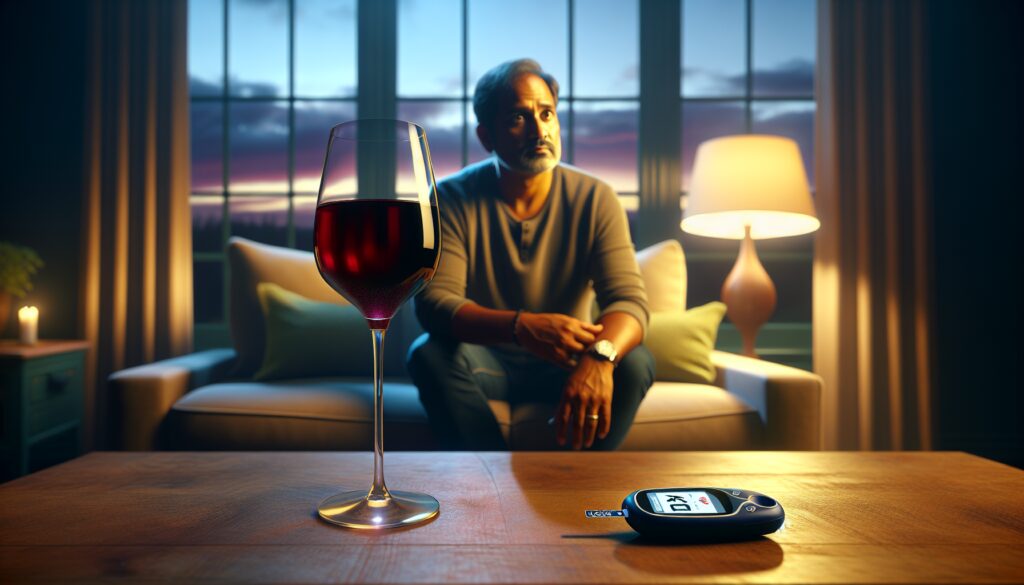
Understanding the intricate relationship between alcohol and blood sugar levels is crucial for individuals with diabetes. Whether you have type 1 or type 2 diabetes, it's important to be aware of how alcohol can affect your blood glucose and overall health.
Drinking alcohol can lead to significant fluctuations in blood sugar levels, which may pose various risks for diabetics. It's essential to know the safest ways to consume alcohol if you choose to drink and how to monitor its effects on your condition.
🔍 Seeking a breakthrough in Type 2 Diabetes management?
Discover our expert insights and innovative approaches on ‘How to Cure Diabetes’.
Click to transform your health journey today!
What you\'ll find in this article?
How Alcohol Affects Blood Sugar Levels
When you consume alcohol, your liver prioritizes its metabolism over maintaining normal blood sugar levels. This can either raise or lower blood sugar, depending on various factors like the amount and type of alcohol consumed, and whether you drink with food.
Alcohol can interfere with the liver's ability to release glucose into the bloodstream, potentially causing hypoglycemia. Additionally, some alcoholic drinks, particularly those high in sugars and carbs, can cause a spike in blood sugar levels.
Moderate alcohol consumption might have a less dramatic effect, but it's still important to monitor your blood sugar levels. Understanding alcohol and blood sugar dynamics is key to maintaining control over your diabetes.
Alcohol consumption can also affect the efficacy of diabetes medications, such as insulin, leading to unpredictable blood sugar levels. Diabetics need to understand how their medications interact with alcohol to avoid potential risks.
Lastly, chronic alcohol consumption may lead to insulin resistance, which is especially concerning for individuals at risk of or managing type 2 diabetes.
Explore our specialized services in diabetes care 🌟.
From personalized diet plans to effective exercise routines, we have what you need to take control of Type 2 Diabetes.
Visit our services page now!








Can Diabetics Safely Drink Alcohol?
Many diabetics wonder whether it's safe for them to drink alcohol. The answer varies depending on individual health factors, but with the right precautions, diabetics can drink alcohol in moderation.
Safe drinking guidelines for diabetics include moderating intake, keeping track of the carb content of alcoholic beverages, and never drinking on an empty stomach. It is also crucial to check blood sugar levels before and after consuming alcohol.
Communication with your healthcare provider is essential to determine safe drinking guidelines for diabetics. They can provide personalized advice based on your medical history and current health status.
Another important consideration is the timing of your drinks. Since alcohol can lead to delayed hypoglycemia, monitoring your blood sugar overnight and the day after drinking is important.
Furthermore, wearing a medical ID that notes your diabetes can be a lifesaver in case you need medical assistance and are unable to communicate your condition.
Risks of Alcohol Consumption for Diabetics
Drinking alcohol can expose diabetics to several risks, including hypoglycemia, hyperglycemia, and long-term complications if not managed well.
Alcohol can lower blood sugar levels and cause hypoglycemia hours after drinking. This risk is increased if alcohol is consumed without food or in large quantities.
Diabetics should also be aware of the impact of alcohol on blood glucose levels. Some alcoholic beverages contain a high amount of carbohydrates and sugars that can lead to a spike in blood sugar levels.
Furthermore, excessive alcohol consumption can contribute to weight gain, a risk factor for type 2 diabetes and complications associated with insulin resistance.
Alcohol can also affect judgment, leading to poor food choices or neglecting to monitor blood sugar levels, which is dangerous for diabetes management.
Lastly, there's an increased risk of interactions between alcohol and diabetes medications. These interactions can make medications less effective or lead to dangerous health outcomes.
Tips for Drinking Alcohol with Diabetes
If you have diabetes and choose to drink alcohol, here are some tips to do it safely:
- Moderation is key: Limit your alcohol intake to the recommended guidelines and avoid binge drinking.
- Always have food with your drinks to help stabilize blood sugar levels.
- Be cautious of sugary mixers that can cause blood sugar spikes; opt for sugar-free or low-carb options instead.
- Check your blood sugar before and after drinking to monitor its effects and manage any fluctuations.
- Stay hydrated by drinking water alongside alcoholic beverages to prevent dehydration.
These alcohol and diabetes management tips can help you make informed choices and minimize risks to your health.
Remember to always have a plan for how you'll handle low blood sugar levels, including carrying glucose tablets or snacks with you.
Lastly, be open about your condition with friends and family, so they can support your efforts to drink responsibly and help you in case of an emergency.
Best Alcoholic Drinks for Diabetes
Choosing the right alcoholic drinks can make a significant difference in how alcohol affects your diabetes. Here are some of the safer options for individuals managing their blood sugar levels:
- Dry wines, which typically have fewer carbohydrates.
- Light beers, which are lower in alcohol and calories.
- Spirits mixed with calorie-free mixers like club soda or water.
It's important to avoid cocktails with high sugar content, such as those made with sweeteners, syrups, or regular soda.
Understanding the carbohydrate content of your drink of choice is essential. Drinks that are lower in carbs tend to have less of an immediate impact on blood sugar levels.
Here's a video that further explains the best alcoholic drinks for diabetes.
When to Seek Medical Advice
Knowing when to seek medical advice is crucial for diabetics who consume alcohol. If you're experiencing any unusual symptoms or your blood sugar levels are consistently too high or too low after drinking, it's time to consult a healthcare professional.
If you are starting a new diabetes medication, check with your doctor to understand how it may interact with alcohol. Your healthcare provider can help you create a plan that accommodates safe alcohol consumption.
In case of signs of severe hypoglycemia or alcohol intoxication, seek immediate medical help. Symptoms may include confusion, seizures, or loss of consciousness.
Regular check-ups are also important for diabetics, especially if you consume alcohol regularly, to monitor your condition and adjust your management plan as needed.
Remember, the decision to drink alcohol should be made in consultation with your healthcare provider to ensure it's safe for your specific health situation.
Exploring Questions on Alcohol and Diabetes
Does Drinking Alcohol Increase Blood Sugar?
Drinking alcohol can both increase and decrease blood sugar levels. The effect depends on several factors, including the type of alcohol and whether it's consumed with food.
While some alcoholic drinks, especially those with high sugar content, can initially raise blood sugar levels, alcohol can also lead to a decrease in blood sugar, particularly if consumed on an empty stomach or in large quantities.
Will Quitting Alcohol Lower Blood Sugar?
Many individuals find that quitting alcohol helps stabilize their blood sugar levels. Because alcohol can interfere with blood sugar control, reducing or eliminating it from your diet can have a positive impact on managing diabetes.
While the immediate effects of stopping alcohol consumption can vary, long-term abstinence may lead to better blood sugar regulation and overall health improvements.
What Alcohol is Worse for Blood Sugar?
Alcoholic beverages high in sugars and carbohydrates, such as sweet cocktails and dessert wines, are generally worse for blood sugar control.
These types of drinks can cause a rapid spike in blood sugar and should be consumed with caution or avoided altogether by individuals with diabetes.
Can Type 2 Diabetics Drink Alcohol?
Type 2 diabetics can drink alcohol in moderation, but they need to be mindful of their choices and their blood sugar levels.
Following safe drinking guidelines, such as choosing low-carb alcoholic options and monitoring blood sugar, is essential for type 2 diabetics who choose to drink.
As with any aspect of diabetes management, consulting with a healthcare provider is crucial for personalized guidance.
In conclusion, while it is possible to enjoy alcohol with diabetes, it requires careful consideration and management. Always prioritize your health and safety, and collaborate with your healthcare provider to enjoy alcohol responsibly.
✨ Other articles you might be interested in:
- Exploring Sex | Diabetes Forum: Addressing Intimacy Issues in Diabetics
- Type 1 child and extracurricular activities: Balancing ballet and strings
- Balancing health and aesthetics: "Don’t get too thin..."
- Managing Diabetes Type 2: Essential Tips for Safe Driving | Diabetes Forum
- Tattoos and piercings with diabetes: Essential safety tips



